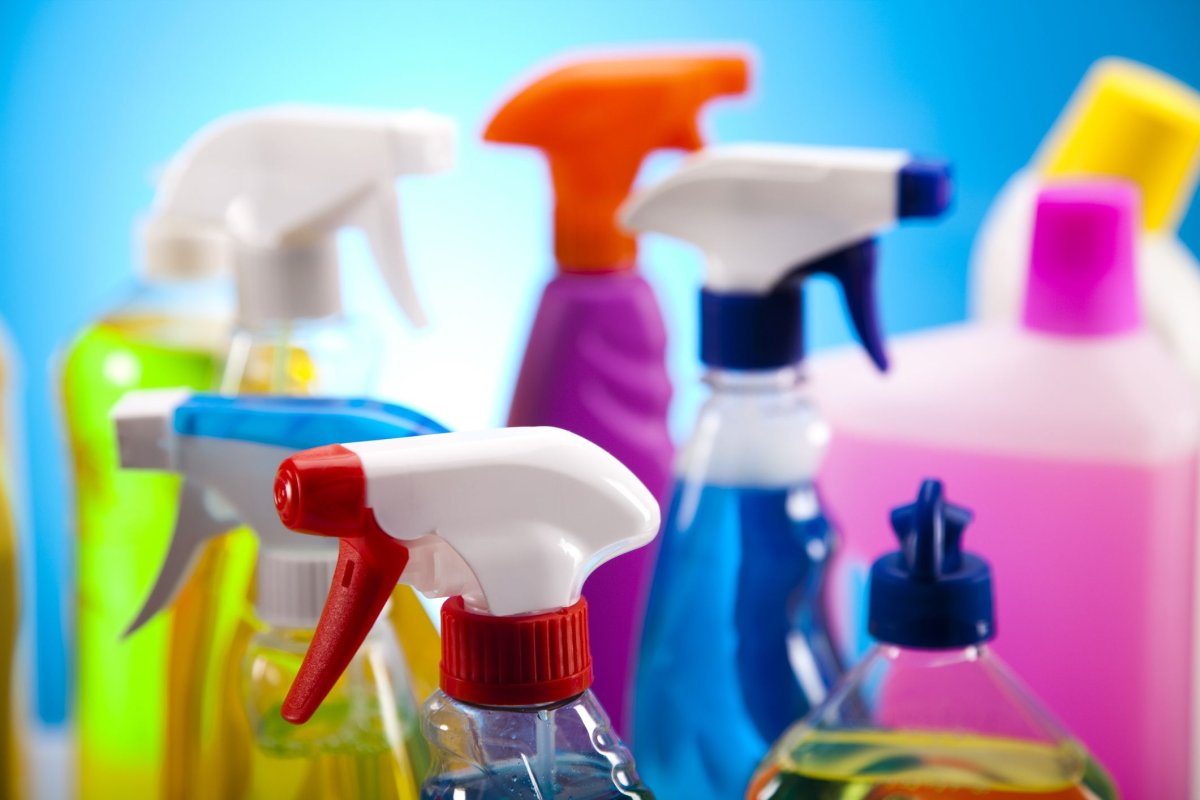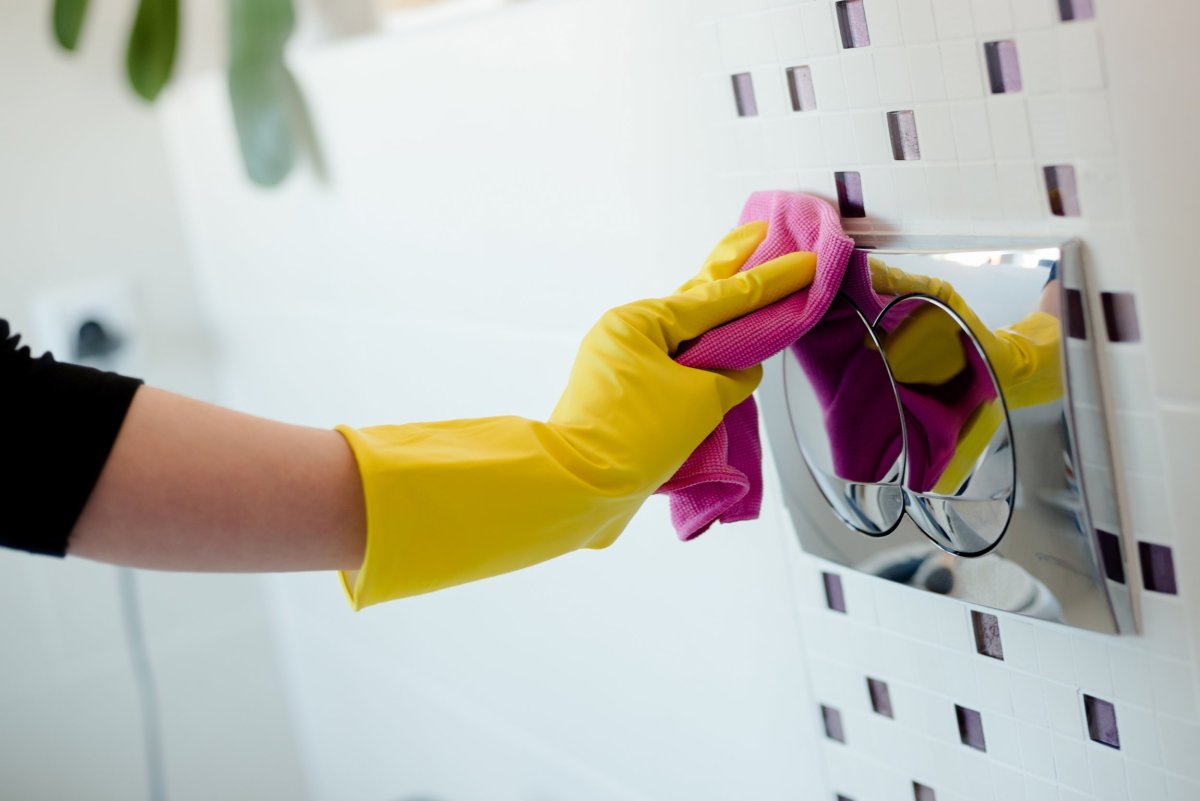Household cleaning products could cause children to become overweight by messing up their gut bacteria, researchers have warned.
Canadian scientists found children who lived in households where disinfectants were used at least once a week had a higher body mass index (BMI) at the age of three compared to children who came in less regular contact with such products. In contrast, children in homes where eco-friendly substances were used were less likely to be overweight.
In the past two decades, more and more households have been using disinfectants, the authors noted, and researchers are working to unpick what this means for children's health. That includes their gut microbiota—the bacteria which populate the digestive tract—which growing evidence suggests can affect everything from our mental health to our risk of developing heart disease.
Scientists at the Canadian Medical Association Journal studied the gut flora of 757 babies aged between three to four months old who were part of the Canadian Healthy Infant Longitudinal Development (CHILD) cohort. The children's fecal samples were collected at the start of the study, to reveal the bacteria which lived in their guts. Researchers also asked parents how often cleaning products were used in the home, and visited residences to check. They then reassessed these children at the age of one and three years old, and measured their weight.

Read more: Eating cheese and butter every day linked to living longer
The study revealed a child's gut microbiota differed depending on which cleaning products were used in their home. Children frequently exposed to disinfectants, for instance, had higher levels of Lachnospiraceae bacteria in their guts than other participants, while Haemophilus levels dropped. Populations of Enterobacteriaceae, on the other hand, fell in children exposed to eco-friendly products.
When a child's weight was measured at the age three, children who came into contact with disinfectants the most had higher BMI scores, while those encountering eco-friendly products—including homemade substances using vinegar—saw an inverse trend.
Dr. Anita Kozyrskyj, a pediatrics professor at University of Alberta, led the study and runs a project investigating how an infant's gut microbiome impacts their health. She explained to Newsweek that Lachnospiraceae are normally found in the gut microbiota of humans but their levels are initially low in three to four month old infants, then increase as children grow. "Hence, our findings are regarding the levels or 'dose' of Lachnospiraceae and not to their presence or absence in young infants."

Their findings were mirrored by animal experiments in which the fecal samples of newborn piglets continually exposed to aerosol disinfectants were tested. Mice with higher levels of Lachnospiraceae in their gut microbiota stored more fat and had greater insulin resistance, she said.
Kozyrskyj acknowledged the study may have been hampered by the reliance on parents reporting their disinfectant use, and not noting the brand names.
But the team can't be certain other factors didn't contribute to a child's weight, Kozyrskyj said.
"Those infants growing up in households with heavy use of eco cleaners had much lower levels of the gut microbes Enterobacteriaceae. However, we found no evidence that these gut microbiome changes caused the reduced obesity risk," she said.
"A possible explanation is that mothers who used eco-friendly products during pregnancy had more nutritious diets and a healthier pregnancy. As a result, their healthy microbiome was passed on to their newborns, leading to both a lower chance of their infants having lower levels of Enterobacteriaceae three to four months later and becoming overweight."
Nevertheless, Kozyrskyj believes the evidence her team collected is enough to suggest the overuse of disinfectants should be avoided, as it may harm our human microbiota.
"When infants are implicated, changing the composition of microbiota at a critical time of development may affect the immune system," she said.
Dr. Cecilie Svanes, professor at the Centre for International Health at the University of Bergen, who was not involved in the study, described the work as "very important." Earlier this year, Svanes and her team published their own research suggesting cleaning products could be as damaging to the lungs as smoking a packet of cigarettes a day.
She told Newsweek: "It adds new and highly significant evidence to the emerging understanding of the rather severe health effects related to the use of cleaning chemicals."
The effects may be even stronger, as parents may have underreported their use of cleaning products, she said.
"This research may fuel further research to identify the specific active substances in the cleaning products, and the mechanisms by which they influence health."
"I would be careful also with the eco-friendly cleaning chemicals," advised Svanes. "There is research showing that cleaning with water and microfiber cloth for most purposes is better than any chemical, and I believe this is the safer option, not least with infants in the home.
This article has been updated with comments from Professor Cecilie Svanes.
Uncommon Knowledge
Newsweek is committed to challenging conventional wisdom and finding connections in the search for common ground.
Newsweek is committed to challenging conventional wisdom and finding connections in the search for common ground.
About the writer
Kashmira Gander is Deputy Science Editor at Newsweek. Her interests include health, gender, LGBTQIA+ issues, human rights, subcultures, music, and lifestyle. Her ... Read more
To read how Newsweek uses AI as a newsroom tool, Click here.






